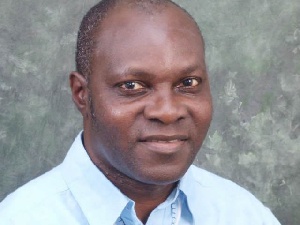 Former NPP Presidential aspirant, Arthur Kennedy
Former NPP Presidential aspirant, Arthur Kennedy
A former presidential aspirant of the New Patriotic Party (NPP), Dr. Arthur Kobina Kennedy has slammed President Akufo-Addo’s comment on the new Public universities bill.
Describing the comments as lacking tact and diplomacy, Dr. Kennedy said although the university bill is a commendable one, the president’s unfortunate comment has provoked a renewed pledge by the president of UTAG and others to fight.
The New Public Universities Bill has been rejected by some professors and former Vice Chancellors stating that the bill is an attempt by government to control the universities. They also claim that the bill takes away academic freedom.
Speaking at the 11th congregation of the University of Professional Studies, President Akufo-Addo said, “The flimsy allegations being perpetrated that the bill undermines academic freedom are deliberate mischief-making and disingenuous”.
However, in an article, Dr. Kennedy who has become estranged for his non-conformist stance on issues affecting the NPP said the bill must be done with proper and broader consultations.
Below is the full article
RE: PUBLIC UNIVERSITIES BILL ( 5th July, 2019)
The public universities bill that is under consideration presents a great opportunity for a serious, substantive national conversation about the role of all our universities–not just public universities in our development. Unfortunately, that debate is being side-tracked by accusations and counter-accusations due to a flawed process. When the first rumblings of misgivings from UTAG surfaced, the Minister for tertiary education, Prof. Yankah counselled patience. He stated that “colleagues in academia panicked too soon”. He added that government had sent a draft document to the Universities and were waiting for feedback. He did not make clear which stakeholders had been consulted.
One would have expected that stakeholders like the University Councils and Vice-Chancellors, UTAG and NUGS would be consulted even before the initial draft.
Unfortunately for the process, President Akufo-Addo weighed in without his usual tact and diplomacy. Speaking at the 11th congregation of the University of Professional Studies, he said, “The flimsy allegations being perpetrated that the bill undermines academic freedom are deliberate mischief-making and disingenuous “. Some have ascribed the bill and the President’s comments to the government’s stumbles at KNUST and UEW– Winneba.
This has provoked UTAG, through its President, to condemnation of the President’s remarks and a pledge to fight the bill.
The President’s comments would tend to diminish his admirable exhortation to all of us ” to be citizens “.The President’s comments and the reaction in some quarters of the Professoriat are unfortunate.
We must commend the government for initiating the bill. Reforming our higher education system is long overdue.
Here are some of the reasons why this initiative is overdue;
1: Africa produces 10 million graduates a year with half of them unemployed a year after graduation while our youth cross the Sahara and the Mediterranean in search of greener pastures and die in their thousands.
2: Our premier University contracted a loan through a process still shrouded in mystery that is being unraveled while gargantuan interests pile up.
3: A few years ago, a Vice-Chancellor opined publicly that it is NOT the duty of the University to prepare people for work!
4: The auditor general just took the University of Ghana to task for lacking proper regulations and procedures in financial decision-making.
So, those who claim that Universities have a right to chart their own course, including the erudite Prof. Gyampoh, are, to put it gently, mistaken. Universities, even private universities, must be guided by the broader interests of society.
However, no government can completely capture the varied interests of all stakeholders. We must be careful that, in reforming public universities, we do not make them indistinguishable from one another. We must be careful, not to make KNUST, nothing more than Kumasi-Legon!. They must not become glorified Senior High Schools.
There are significant concerns with the draft bill, regarding the appointment of chancellor, the ability of the Universities to make agreements and the role of the NCTE.
Indeed, around the world, most experts believe that government should do the following broad things regarding public higher education:
1: Subsidize higher education for those without the means.
2: Collect and disseminate data on education.
3:Determine broad criteria for eligibility– for students and institutions.
4:Support research activity by universities.
5: Ensure institutional accountability.
Across the globe, nations– from Australia to China are moving towards more– not less– institutional autonomy for universities. They accept that autonomy is central to the university’s mission.
We must not truncate this important process or muzzle any stakeholders. These must include the government, industry, University authorities, lecturers, students and the public. The United Kingdom, whose top Universities regularly rank amongst the best in the world, passed the Higher Education and Research Act in 2017 after an arduous process that included 500 proposed amendments!
UTAG should not oppose this proposed bill, it should SHAPE it– in partnership with NUGS and University authorities. It should detail its objections with clear alternatives and examples of best practices. And it should make Parliament actually listen to stakeholders and craft a law that truly incorporates the input of all stakeholders.
Let us respect the axiom that we should not initiate profound changes based upon slender majorities.
Long live All the unique Legons– Accra Legon, Kumasi Legon and the others.
Long live Ghana.
Arthur Kobina Kennedy